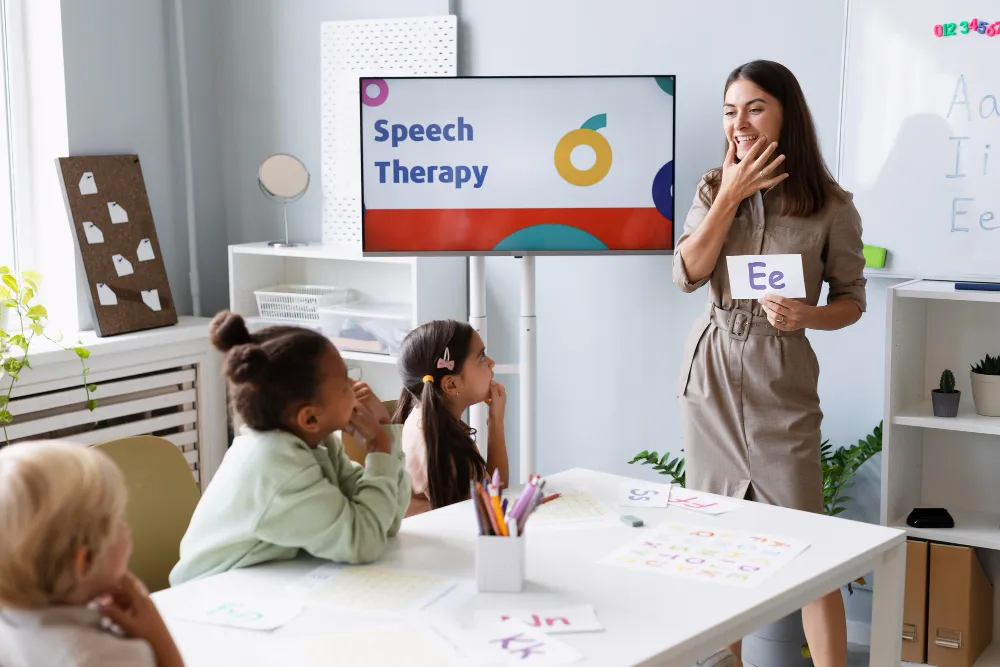
Tell us what you or your loved one would like help with — from speech clarity and language development to social skills or safe eating and drinking.
We’ll connect you with qualified NDIS speech pathologists in Perth who are available and suited to your goals.
Your therapist will complete an initial assessment, then design a therapy plan that supports your communication development and day-to-day life.

NDIS speech therapy is a service delivered by qualified speech pathologists to support people with disabilities who experience difficulties with communication, language, social interaction, or swallowing. Funded through the National Disability Insurance Scheme (NDIS), this therapy aims to improve everyday communication skills, enhance quality of life, and support safe mealtime practices.
Therapy may focus on speaking clearly, understanding or using language, expressing needs, using alternative communication tools, or managing swallowing difficulties (dysphagia). In Perth, NDIS speech therapy is available in homes, clinics, schools, and community settings, with sessions tailored to each person’s age, ability, and goals.
Speech pathologists work closely with participants, families, and support teams to assess needs, create individualised plans, and deliver therapy that fits real-life routines.
Speech therapy looks different for everyone — and that’s exactly the point. NDIS participants in Perth can access flexible, personalised support designed around their goals, routines, and communication needs.

Speech pathologists begin by getting to know how you or your loved one communicates across different settings. Through structured activities, observation, and discussion, they build a detailed picture of strengths and areas needing support — forming the foundation for an effective therapy plan.

For individuals who struggle to say words clearly, therapy focuses on training the coordination of the mouth, tongue, and breath. This work helps make speech easier to understand, allowing for smoother interactions in daily life.

When understanding or expressing language is difficult, therapy works on building these abilities step by step. Speech pathologists help people expand their vocabulary, organise thoughts into sentences, and follow or give instructions more effectively.

Speech therapy helps improve skills needed for social interaction. This may include learning to take turns in conversation, understanding facial expressions, and using appropriate tone and body language.

If swallowing causes coughing, choking, or discomfort, therapy can make eating safer and less stressful. Speech pathologists assess swallowing ability and suggest strategies — like modified food textures or posture adjustments — to support safe, enjoyable mealtimes.

When speaking isn’t the best way to communicate, AAC tools offer other options. Therapists introduce devices, visuals, or apps that suit the person’s needs and provide guidance on using them effectively in everyday situations.

For those facing literacy challenges, therapy supports how words are seen, sounded out, and used. This might include early reading skills, spelling, or writing tasks. Support is always tailored to how the person learns and communicates best.

Conditions such as autism, stroke, or brain injury can impact communication and cognition. Speech therapy focuses on building or restoring these skills — helping individuals engage in conversations, understand routines, and participate more independently in daily activities.
NDIS speech therapy helps people with disabilities improve how they communicate and interact in everyday situations — at home, school, work, or in the community. Whether someone struggles with speaking clearly, understanding language, using social cues, or safely swallowing, therapy focuses on practical outcomes that matter day-to-day.
For children, this might mean following classroom instructions, joining in play, or expressing feelings more confidently. For adults, therapy can support tasks like making phone calls, asking questions at work, or joining community activities without frustration.
Speech therapists also introduce tools like visuals, communication devices, or simplified language systems when verbal communication is difficult. All strategies are personalised, helping each person feel more confident, understood, and independent in daily life.


Speech therapy is tailored to what you need — whether that’s clearer pronunciation, better understanding, or confident social communication. No two therapy plans are the same.
Sessions are delivered around your routine — at home, online, in clinics, or within your local Perth community. Therapy is designed to fit into your life, not disrupt it.
Therapy targets what matters — from saying your name clearly to asking for help, joining conversations, or using a device to express needs confidently.

Yes — speech therapists help individuals strengthen both understanding (receptive language) and use of words (expressive language).
Involvement is encouraged, especially for children. Family participation helps reinforce therapy strategies in daily life.
Absolutely. Therapists introduce and teach how to use AAC tools suited to each person’s needs.
It depends on the individual and their goals. Some changes appear quickly, while others require consistent support over time.
Yes — speech therapists help individuals with conversational turn-taking, reading social cues, and feeling more confident in interactions.
Speech therapy focuses on communication and swallowing, while occupational therapy supports physical, cognitive, and sensory skills needed for daily activities.